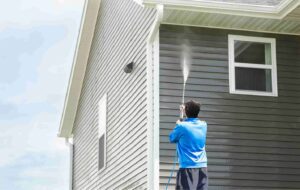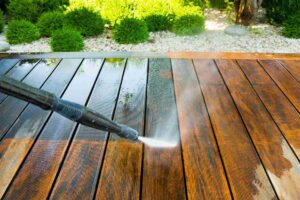The Step by Step Guide to Cleaning Pavers
Updated on: July 7, 2023
Are your patio pavers looking dingy and old? Are you thinking about replacing them? You should first know patio pavers are a big investment. The average paver patio costs around $15 a square foot to replace, which can run you anywhere from $2,000 to $4,000 to replace depending on size. But there’s actually another solution instead of shelling out thousands of dollars. You can clean them! Check out our handy instruction guide for how to clean patio pavers by pressure washing.
How to Clean Pavers: An Overview
Patios make a huge difference in your home’s curb appeal. You want them to stay nice so they don’t have a negative impact on your home’s look. Even though pavers are very durable and reliable, especially concrete pavers, they still begin to get a little scruffy after all the fun barbecues and weather conditions take their toll. Overall, cleaning your pavers properly has more benefits than just making them look nice—regular cleanings make your pavers more durable and safer, too. Plus, cleaning paver stones is a simple process: first, you need to choose an appropriate cleaning method. Then remove any weeds or brush from the area. Next, make sure to seal chips, repair damaged grout lines, and replace any broken pavers, if necessary. Finally, you’re ready to apply your cleaning solution and wash off any dirt and stains with a light scrubber. When finished, completely rinse the area with fresh water.
As a rule of thumb, if you maintain your pavers, cleaning is less time-consuming and less costly since you won’t have to restore or replace them all the time—so let’s get started.
Step #1: Choose a Cleaning Method
To begin, you should power wash your patio annually. You may need to purchase a basic cleaning solution for your pavers, or you can simply create a homemade water and white vinegar solution to remove stubborn dirt and stains. Be sure to only use white vinegar. Darker vinegar may stain pavers.
Effective Cleaning Methods
-
- Pressure Washing: Using a pressure washer to clean your pavers helps remove any tough stains and breakdown all buildups. Believe it or not, grass, leaves, dust, debris, and spills leave marks on your patio over time.
- Dish Soap: A great way to clean patio pavers without removing any sand or decorative texture is by simply cleaning with a gentle soap or degreaser like Dawn. Add the dish soap to a container of water, then start lightly scrubbing the dirty spots with a rag, sponge or a stiff-bristled brush.
- Simple Green: It does not have any harsh chemicals to discolor or ruin your stones, and easily cuts through dirt and stains.
- White Vinegar and Water: A more natural way to touch-up your concrete pavers or paver stones is to use a mixture of water and white vinegar. Let the vinegar mixture sit on the pavers for about an hour before using soap and water to scrub away any stains.
- Use a Broom: It’s important to remove dirt regularly from your patio stones.
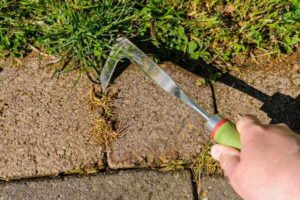 Step #2: Remove Weeds
Step #2: Remove Weeds
Weeds grow between the seams and are more than eyesores; they can also weaken these seams. Use an anti-weed agent to solve this problem, or mix together a DIY solution like this one from HGTV. Damage caused by weeds can be especially costly when you have larger concrete pavers due to the price of replacing multiple tiles. You can also use certain tools like a patio knife so long as you’re careful not to scratch the surface of your pavers.
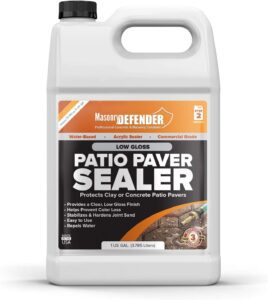 Step #3: Seal Pavers
Step #3: Seal Pavers
You should re-seal your patio pavers at least every couple of years to help guard against stains and prevent chips. Simply apply sealers with a paintbrush after your patio is fully cleaned. This is an important step regardless of if your patio utilizes concrete pavers or another material. Sealing prevents weeds from growing between your pavers, and it also can help reduce damage caused by the elements.
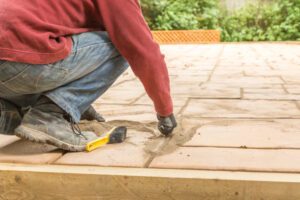 Step #4: Repair Grout Lines
Step #4: Repair Grout Lines
Use a putty knife to apply a small amount of grout where you need it. Then, make sure you remove any excess grout from the pavers because it could stain. To do this, use a wire brush to remove the dried grout traces.
Step #5: Replace Pavers as Needed
No matter how often you clean, you may need to replace a few pavers once in a while. While this isn’t a must-do “step,” it could be necessary. Overall, it’s easy to replace a new stone without damaging the area. Getting rid of that damaged stone will enhance your patio instantly.
Tips for Cleaning Different Types of Pavers
While the cleaning process doesn’t vary much from one type of stone to another, there are some specific things to keep in mind when cleaning your patio to avoid damaging your pavers.
Natural Stone
Keep in mind that with natural stone, you should avoid harsh chemicals. Chemicals that are abrasive or particularly acidic can be damaging to your natural stone pavers. It’s best to stick with detergents or a vinegar-water solution to remove stubborn stains.
Brick
While in many cases cleaning a patio only needs to be done annually, brick may be an exception to this. Brick is a porous stone, meaning that it may need to be cleaned more frequently to prevent stains from settling deeper in the brick.
Concrete
Muriatic acid, also known as hydrochloric acid, is frequently used as a heavy-duty cleaner for concrete pavers, but the reason it is so effective at removing stains from concrete is portland cement, the binder in concrete pavers, dissolves on contact with an acid. The result? Clean, but weaker concrete. Instead, consider cleaning solutions that use detergents, or less aggressive acids that won’t be as damaging to your concrete pavers.
How NOT to Clean Patio Pavers
As we mentioned above with muriatic acid, certain cleaning agents can do more harm than good to your patio. Here are some tips for keeping your patio clean throughout the year and what to avoid while you’re cleaning your patio.
- Keep your gutters clean. While less obvious, clogged gutters can lead to patio damage. When water settles in areas it shouldn’t, such as on your brick patio, it can lead to stains and damage caused by sitting water.
- Be mindful of decorations. Plants, pots and other patio decors can lead to stains and mildew growth on your patio, which can make cleaning a more tedious chore than it needs to be. Make sure to regularly clean under patio decorations, or choose decor that doesn’t encourage algae, mildew and grime growth.
- Avoid using wire or steel brushes on certain materials. In some cases, it’s unwise to use rougher brushes on natural stone. Sandstone, for example, can become damaged when using more abrasive brushes.
- Use less abrasive cleaning solutions. For some materials, such as concrete pavers, particularly acidic cleaners are a bad idea. The same thing applies to certain other materials that have a large amount of calcium, such as sandstone, limestone or marble.
Need Help Cleaning Pavers with a Pressure Washing?
If you pressure wash your pavers correctly, it will help your property look good as new. However, don’t fret if you don’t want to handle cleaning pavers with a pressure washer on your own—it can be intimidating because you don’t want to ruin your patio and displace the pavers. Instead, rely on the experts who know how to pressure wash your pavers with care and efficiency. Labor Panes’ soft touch wash is safe for all types of surfaces and our team is highly trained to get the job done right the first time. Contact us today for a free quote to clean any part of your home’s exterior—we do it all from pavers, windows, gutters, siding, and more.
Frequently Asked Questions for Cleaning Patio Pavers
How can I make my pavers look new again?
At least once a year, you should power wash your patio using detergents or, if it is safe for your patio, acidic solutions. We also recommend that you prevent sitting water and mildew growth—it goes a long way toward keeping your patio looking new.
Will vinegar damage patio pavers?
If diluted properly, no. Vinegar is an acid, so for some materials, it can be too abrasive if applied directly. But, creating a vinegar-water solution should clean your patio without damaging it.
Is it ok to pressure wash pavers?
Yes, it is okay to pressure wash pavers. But, it’s important to use the correct PSI and tip to ensure that you do not damage certain materials, such as concrete pavers.
What is the best cleaner for paving slabs?
To clean paver slabs, you can use a detergent, such as Dawn, or a vinegar-water solution that is gentle enough to effectively clean without causing damage to your concrete pavers.
